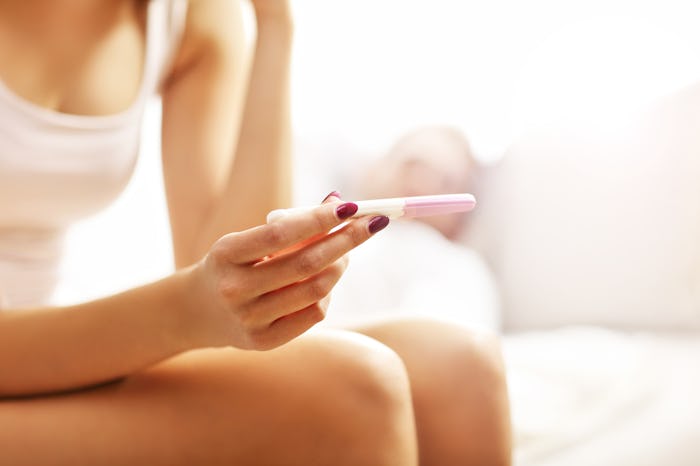Life

Does It Matter How Much You Pee On A Pregnancy Test? An Expert Explains
Pregnancy tests. They seem simple enough, right? But then the moment comes to take one and all of a sudden you're holding a plastic stick between your legs while trying to simultaneously aim your urine in a specific direction and not pee on yourself. They are tricky little suckers. And don't even get me started on choosing one from the seemingly hundreds available at any store. How do you find the right one and, when you do, does it matter how much you pee on a pregnancy test? For some, the struggle is real.
Luckily, you don't have to chug a liter of water before taking a test. "The amount of urine needed to do a pregnancy test is very little," Dr. G. Thomas Ruiz, OB-GYN at MemorialCare Orange Coast Medical Center in Fountain Valley, California, tells Romper in an email interview. "Volume of urine makes no difference. Some instruction kits recommend using the first urine of the day because that is when it is most concentrated."
Dr. Sheeva Talebian, co-founder of Truly-MD.com and director of third party reproduction at the New York branch of the Colorado Center for Reproductive Medicine, tells Romper that it's not so much the quantity of urine, as it is time of day that can affect the accuracy of a pregnancy test.
Dr. Janet Choi, a reproductive endocrinologist and the medical director with the Colorado Center for Reproductive Medicine in New York points out that if you are testing in the first few days of pregnancy, then there isn't much human chorionic gonadotropin (hCG) — also known as the pregnancy hormone — floating in your urine or bloodstream. "So, particularly if you’re testing very early on (i.e. exactly 14 days after ovulation), then you will want to make sure there’s enough urine containing enough pregnancy hormone to turn the test strip positive," she tells Romper in an email interview, adding that usually five drops or more will do the trick. "This is also why many of the tests will advise you to test the first, most concentrated urine of the day and not the more diluted stuff that results from liquids consumed during the day."
But how do you choose a test? Hit up any drug store and you'll notice that there are quite a few choices when it comes to pregnancy tests. Try to keep in mind that each test is ultimately looking for the same thing — hCG. The chemical strip on the dipstick detects hCG, which the body will start to produce after an embryo implants, according to Parenting magazine.
As for actually getting down to business, there are a few basic rules to follow in addition to taking the test first thing in the morning. It might seem like a no-brainer, but read the instructions. That means that if the test has a required wait time, then be sure to stand by before checking the results. Most home pregnancy tests also advise you to set the test on a flat surface after you've finished taking it, so be sure to find a happy, even spot for it.
Other things to look for include checking the expiration date on your pregnancy tests. If you've been trying to conceive for a bit of time, then you might have a few tests on hand that are expired. Of course, if you take the test and still don't get a positive result — or your period — then it might be time to visit your healthcare provider to ask questions and find out what's going on.
As for narrowly missing your hand while trying to take a test? Well, I'm not sure I can help you with that one. The best thing I can say is that if you are pregnant, then hand sanitizer is about to be your knew best friend when your little one arrives. Keep some close by when testing and — voila — problem solved.
Check out Romper's new video series, Romper's Doula Diaries:
Check out the entire Romper's Doula Diaries series and other videos on Facebook and the Bustle app across Apple TV, Roku, and Amazon Fire TV.